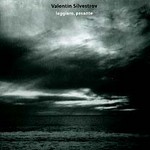
leggiero, pesante: String Quartet No. 1 and other chamber works
 $40.00
Out of Stock
$40.00
Out of Stock6+ weeks add to cart
VALENTIN SILVESTROV
leggiero, pesante: String Quartet No. 1 and other chamber works
Rosamunde Quartett / Anja Lechner (cello) / Silke Avenhaus (piano)
[ ECM / CD ]
Release Date: Tuesday 1 January 2002
This item is currently out of stock. It may take 6 or more weeks to obtain from when you place your order as this is a specialist product.
"Silvestrov's own rendition of Hymn 2001 offers a fascinating glimpse into the performing style he has in mind - everything delivered in a shadowy undertone and heavily pedalled. It makes a fitting conclusion to a beautiful, yet far from unchallenging programme."
International Record Review
"Valentin Silverstrov's brand of musical post-modernism is a more literal one than most. It initially involved an act of voluntary disarmament, as he once put it, when he set aside the trappings of modernism that he had explored as thoroughly as any of his colleagues in the Soviet Union and with a considerable degree of notoriety in his native Ukraine. It also involved, and still involves, an exploration of music "after the death of music". What we seem to hear from him is not real music at all but echoes from some psycho-acoustic pond first stirred into life decades or centuries ago. The Fifth Symphony is the finest example of this Postlude manner, but all the chamber works on this excellent ECM disc are worthy companion pieces. The Cello Sonata was composed in 1983, in the aftermath of the Fifth Symphony, and revisits its characteristic images of oscillation and evanescent melodic beauty, discovered somewhere beyond the ugliness of the real world...The First String Quartet of 1973, another single-movement structure of similar length, is comparable gripping. From its familiar-seeming triadic opening the music flutters, nearly expires, and rears up again in Janácekian flurries before finding its psychic equilibrium...Bathed in more generous ambience than the Sonata or the Quartet, the Postludes of 1981-82 are like fragments of music you might recall in a clairvoyant moment before death ... Silvestrov's own rendition of Hymn 2001 offers a fascinating glimpse into the performing style he has in mind - everything delivered in a shadowy undertone and heavily pedalled. It makes a fitting conclusion to a beautiful, yet far from unchallenging programme."
David Fanning, International Record Review
"Of all the words in music's vocabulary, one of the commonest is "farewell." Many of the world's greatest songs are addressed to the departing: the recently dead, lost lovers, missed opportunities. Music speaks of these things as memory speaks, makes us aware both of distance and of remaining closeness. Nothing is lost, music says: it is here. But also: it is here only because it cannot come back. ... When it addresses leave-taking specifically, it has terms that include some of the oldest in the Western tradition. A four-note scalewise descent in the minor mode has been an image of lament since the Renaissance, and perhaps it accounts for the atmosphere of sadness that often gathers around minor-key harmony. A final cadence, particularly in slow music, can also sound like a valedicition, because this is the point at which music not only expresses passing but itself recedes.This vanishing and this eternal presence have been the Ukrainian composer Valentin Silvestrov's persistent topics through the last three decades, since he was in his 30's and, like his Soviet contemporary Arvo Pärt, heard the past sounding through the gaps in modernism. ...At the opening of the First Quartet, for instance, there are the falling phrases and the omnipresent cadences that convey appeased grief, all at a very relaxed tempo and in a harmonic ambience as straightforward as that of a folk song. The Barber Adagio is only a step away. But then the picture begins to cloud. An expected harmony does not arrive and cannot be found. The instruments start slowly circling because they cannot think what else to do. Inexplicable dissonances creep in. The music seems to be losing its way, and eventually it just comes to a sounding stop on a sustained soft discord, fading into toneless whispers.There is an effort here to refresh aged notions. Because Mr. Silvestrov's turns of phrase are never quite completed - or because any completion sounds partial and tentative - they reach to some extent from the realm of the borrowed to speak firmly and newly. And they help themselves do so both by taking on novel timbres ( the vibratoless sounds of the quartet) and by extending a strong appeal to their performers (an appeal to which a particularly powerful, rich and vital response comes from the cellist Anja Lechner and the pianist Silke Avenhaus in two works)."
Paul Griffiths, The New York Times
Tracks:
Sonata for cello and piano
String Quartett No. 1
Postludium No. 1
Postludium No. 2
Postludium No. 3
Hymne 2001
